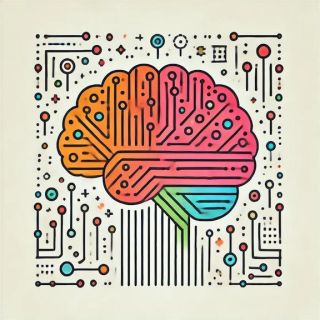Artificial Intelligence
Our Technology-Powered Thought Laboratory
AI and neurotech are reinventing the very nature of the thought experiment.
Posted August 8, 2024 Reviewed by Jessica Schrader
Key points
- From Plato to Einstein, thought experiments have driven major breakthroughs in science and philosophy.
- AI, brain interfaces, and thought-to-text tech are poised to supercharge mental exploration.
- Human-AI symbiosis promises to solve complex problems rapidly, sparking a new age of discovery.

Think about it. There may be no greater engine of transformation than the human brain. And throughout history, thought experiments have been the silent engines of intellectual progress, driving paradigm shifts in science, philosophy, and human understanding. From Plato's Allegory of the Cave to Einstein's elevator, these mental exercises have allowed thinkers to transcend the limitations of their physical world and explore the realm of pure ideas.
The power of thought experiments lies in their ability to distill complex concepts into digestible narratives, making the abstract tangible and the impossible imaginable. In ancient Greece, Zeno's paradoxes challenged our understanding of motion and infinity, laying the groundwork for calculus two millennia before its formal development. During the Scientific Revolution, Galileo's thought experiment of dropping balls from the Leaning Tower of Pisa (which he likely never actually performed) helped overturn Aristotelian physics and pave the way for Newton's laws of motion.
Revolutionizing Science and Philosophy
Perhaps no field has benefited more from thought experiments than physics. Einstein's famous musings about riding alongside a beam of light led to the development of special relativity, revolutionizing our understanding of space and time. Schrödinger's cat, a paradoxical feline both alive and dead, illuminated the bizarre implications of quantum superposition. These mental exercises have pushed the boundaries of human knowledge, allowing us to probe realms far beyond the reach of contemporary technology or experimentation.
The Dawn of Neuro-Enhanced Thinking
Now, as we stand on the brink of a new technological revolution, the humble thought experiment is poised for a dramatic evolution. The convergence of brain-computer interfaces (BCIs) like Neuralink, "thought-to-text" technologies, and large language models (LLMs) promises to transform the landscape of intellectual exploration in ways our predecessors could scarcely have imagined.
Imagine a world where the barriers between mind and machine dissolve, where thoughts can be transmitted at the speed of neurons firing. This is the promise of advanced BCIs and thought-to-text technologies. No longer constrained by the relatively slow process of typing or speaking, this new technology could potentially transfer complex ideas, hypotheses, and entire thought experiments directly from their brains to computer systems in ways that make "the blink of an eye" seem antiquated and sluggish.
AI as the Cognitive Amplifier
Enter large language models, the artificial intelligences that have already demonstrated remarkable capabilities in processing and generating human-like text. When coupled with the rapid influx of direct "pre-language thought" input, these LLMs could serve as cognitive amplifiers of unprecedented power.
As thoughts flow directly from the mind mind into the AI system, the LLM could instantaneously expand on the initial concepts, drawing connections across vast databases of scientific knowledge. It could generate multiple variations and permutations of the original thought experiment, identify potential flaws or inconsistencies in the logic, and suggest novel approaches or angles that the human mind might not have considered.
The Expanded Laboratory of the Mind
This symbiosis of human creativity and AI processing power could create a feedback loop of innovation, with each iteration refining and elevating the original concept. In this new and startling reality, a modern-day Einstein could conceive of a thought experiment akin to riding a beam of light, and within seconds have the concept fully articulated and modeled by the AI, receive instant feedback on its implications across multiple fields of physics, see visualizations of how this thought experiment interacts with our current understanding of the universe, and explore dozens of variations and extensions of the original idea.
The potential for scientific breakthroughs in this environment is staggering. Complex problems that might have taken years of contemplation and collaboration could potentially be unraveled in days or even hours. We're not just enhancing thought experiments—we're creating an entirely new domain of intellectual exploration, a "laboratory of the mind" where the boundaries between imagination and computation blur, where abstract ideas can be manipulated, tested, and evolved with unprecedented speed and precision.
Thinking About Ethics
However, this brave new world of thought experimentation is not without its challenges and ethical considerations. Privacy concerns are paramount—how do we ensure the sanctity of one's innermost thoughts when they can be so easily externalized? There's also the question of cognitive equality—would such technology create an insurmountable gap between those with access to these advanced systems and those without?
It's also critical to consider the potential for cognitive dependency. If we rely too heavily on AI-augmented thought processes, do we risk atrophying our natural cognitive abilities? How do we maintain the uniquely human aspects of creativity and intuition in this new landscape?
Future Thought
Despite these challenges, the potential benefits of this technology are too profound to ignore. We stand at the threshold of a new Cognitive Age, one in which the constraints on human thought and creativity are dramatically loosened. This fusion of direct brain-computer interfaces, thought-to-text technology, and advanced AI could spawn a new generation of thinkers—modern-day Einsteins equipped with cognitive tools beyond anything we've seen before.
The future of thought experimentation is no longer confined to the limits of individual human cognition. Instead, it expands into a vast, collaborative space where human creativity and artificial intelligence dance in a symphony of ideas, pushing the boundaries of what's possible and redefining the very nature of thinking itself. As we stand on the shoulders of giants like Plato, Galileo, and Einstein, we prepare to take a leap into a future where the power of thought knows no bounds.




